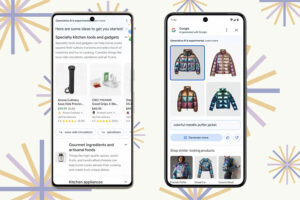ShopTalk 2016 Trends: The traditional apparel industry into a new era
In a session during ShopTalk in Las Vegas, Katrina Lake, CEO and founder of Stitch Fix, said her online company’s ‘fix’ is about eliminating the shortcomings in traditional fashion retail.
“We’re fixing the weak spots of buying apparel online,” said Lake about her subscription-based apparel company. “There is an opportunity to evolve the brick-and-mortar experience online, and a lot of the inspiration is what brick and mortars need to be. It’s the service, the personal help aspect, that’s what we’re aiming to fix.”
Based on style profiles — personal data provided by customers, including body size, style preferences and specific apparel needs for lifestyle activities — Stitch Fix stylists choose and send customers five outfits via mail. Members can return items they don’t want and pay for outfits they want. The goal for Stitch Fix is to keep return activity down and drive purchase conversion.
“It’s a lot of art and science,” said Lake, noting her company boasted a large data team (about 80 scientists, 50 of which hold PhDs, she noted). The scientists play a critical role in the recommendation process, just as an important as the stylists’ roles.
“There is human involvement. We hold ourselves accountable in asking what is needed to give members the best experience,” said Lake.
The data collection and analysis is qualitative and quantitative and viewed not as “big data,” but “small data.”
“It’s high-signal data,” Lake said. “Connection with customers is not guesses or based on Twitter feeds, but much more actionable data, accurate data. We can’t lose the trust of the customer. We hold ourselves accountable in asking what is needed to give the best experience.”
The 5-year-old company has about 4,000 employees and is prepping a male clothing recommendation service to launch this year.
“It’s still super early but super interesting. Men and women are much more similar than what we may think when it comes to clothing and fashion. I’m surprised at the feedback, both the positive and the negative in terms of body and {styling] insecurities,” said Lake.
Rebecca Minkoff models in-store experience after Apple
At Rebecca Minkoff, the quest is do everything to disrupt the fashion industry, said Uri Minkoff, co-founder with his sister Rebecca, during his ShopTalk presentation. The siblings launched their brick-and-mortar fashion and apparel retail business in 2005, out of Rebecca’s apartment during a tenuous time in her personal life.They now operate several stores in SoHo, New York, and a store in Los Angles.
The luxury accessories, footwear and apparel company, which focuses on playful and subtly edgy designs, started with one handbag, described on the company’s website as the “Morning After Bag.” The global lifestyle brand also offers men’s clothing and accessories under the label, Uri Minkoff. The brand has three domestic retail stores, two international locations, and is distributed in over 900 stores worldwide.
Describing his company as a ‘peer-to-peer’ retailer, the goal is to be the Trojan horse of the fashion industry, said Uri Minkoff.
“We are a super peer,” said Minkoff, adding that the goal is to “help the customer feel like she owns the dressing room,” while eliminating the aspect of waiting online to make a purchase.
The company embraced interactive, personalization technology from the start to help shoppers with clothing and accessory recommendation. In fact, it’s in the dressing room environment where consumers can explore potential clothing articles via digital screens and have those items brought to them in the dressing area.
Rebecca Minkoff stores, said the co-founder, are “community entertainment hugs, showrooms and distribution centers.” He described the shopping experience as providing a cultural moment for consumers similar to Apple’s retail approach.
Going forward, the company aims to embrace virtual reality and augmented reality and continue to build a relationship with consumers in a peer-to-peer connection.
“Technology is a big part of our brand; experience is a big part of our brand,” said Minkoff.
The strategy is clearly paying off as the fitting room’s interactive environment is spurring sales three-fold, he said.
Revolve thrives on customer self-expression
At Revolve, which has been quietly operating online for over a decade, the goal is providing its core Millennial customer with young, fun apparel via a simple strategy, said Co-founders Michael Karanikolas and Mike Mente. The men shared their business strategies during ShopTalk’s Fireside Chat Series.
“The final word is always the customer,” said Karanikolas.
The fashion etailer boasts 500 brands and makes a deep connection with each one. The brand has seven product lines sold online and via partners, including Nordstrom, but its customers are not interested in mass-market apparel. They prefer micro labels and special fashion pieces.
“We aim to meet the individuality need, the customer’s self-expression,” said Karanikolas.
http://www.retailcustomerexperience.com/articles/fashion-upstarts-aim-to-flip-apparel-industry-into-new-customer-experience-era/?utm_source=Email_marketing&utm_campaign=EMNARCE05202016&cmp=1&utm_medium=html_email




